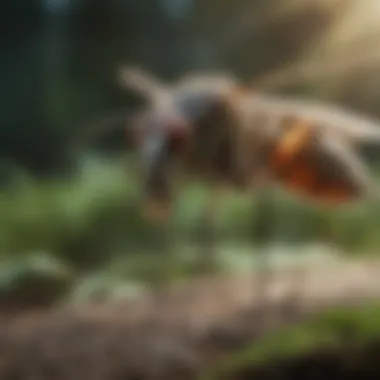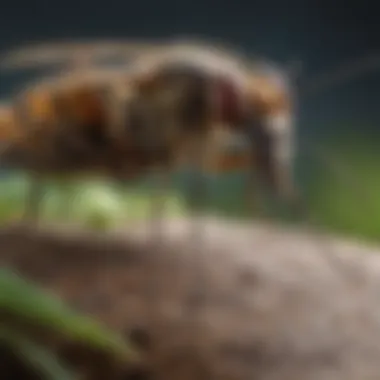Protect Your Plants: Effective Ways to Keep Mosquitoes Away


Preventive Pest Control Strategies
As a diligent homeowner, it is essential to prioritize preventive pest control strategies to safeguard your household and plants. Beginning with a focus on the house exterior, sealing cracks and crevices is paramount to prevent pests like mosquitoes from finding their way indoors. Clearing debris from your surroundings eliminates hiding spots for pests and reduces their entry points. To further secure your home, implementing measures to stop pests from entering, such as installing screens on windows and doors, will bolster your defense against unwanted insects.
In addition to safeguarding the exterior, yard maintenance plays a crucial role in pest prevention. Regular yard care routines, including trimming vegetation and eliminating standing water, help deter mosquitoes and other pests from breeding on your property. Adopting methods for keeping your yard pest-free, such as natural repellents and environmentally friendly pesticides, will aid in establishing a pest-resistant outdoor environment.
Turning attention to indoor cleanliness, maintaining a hygienic living space is fundamental in deterring pests. Expert cleaning tips and techniques, like vacuuming regularly and decluttering, reduce potential hiding spots for pests and create an unfriendly environment for their survival. Furthermore, establishing a pest-resistant indoor environment through proper storage of food and trash disposal practices will contribute significantly to pest control efforts.
Efficient waste disposal methods are paramount in minimizing attractants for pests such as mosquitoes. Proper garbage disposal, including sealing trash bins and composting appropriately, helps eliminate breeding grounds for pests and reduces their presence in and around your home. By understanding the importance of adequate waste management and implementing appropriate disposal techniques, you can effectively diminish pest populations on your property.
Exploring other pest prevention strategies beyond traditional methods is crucial for comprehensive pest control. Innovations like electronic repellent devices, natural predators, and botanical solutions offer alternative approaches to managing pests effectively. By integrating these innovative strategies into your pest control regimen, you can enhance the protection of your plants and home against unwanted insect intruders.
Introduction
In the realm of plant care, ensuring the protection of your green companions from pests is a top priority for any plant enthusiast. One particularly pesky intruder that can wreak havoc on your plants is the common mosquito. These tiny yet troublesome insects not only serve as a nuisance but can also transmit diseases and cause harm to your beloved plant life. Therefore, it is imperative to implement effective strategies to keep mosquitoes at bay and safeguard the health and well-being of your plants.
Considering the delicate balance that exists within your plant ecosystem, it is crucial to address the threat posed by mosquitoes in a proactive manner. By understanding the habits and attraction factors of mosquitoes, you can better equip yourself with the knowledge needed to protect your plants effectively. Moreover, being aware of the potential risks associated with mosquito infestations can motivate you to take the necessary steps to ensure the longevity and vitality of your greenery.
Understanding the Threat
Mosquitoes pose a dual threat to both humans and plants alike. These tiny, blood-sucking insects have the ability to not only cause discomfort with their bites but also transmit a variety of diseases that can be detrimental to both human and plant health. When it comes to plants, mosquitoes can interfere with their growth and development by feeding on their sap, robbing them of essential nutrients, and potentially introducing harmful pathogens.
Furthermore, female mosquitoes require blood meals to lay their eggs, leading them to seek out hosts, including plants, for sustenance. This quest for blood makes plants vulnerable targets for mosquito feeding, thereby putting them at risk of damage and disease transmission. In addition to the direct physical harm caused by mosquito feeding, these insects can also serve as vectors for plant viruses and pathogens, further jeopardizing the well-being of your horticultural investments.


To effectively combat the threat posed by mosquitoes to your plants, a multi-faceted approach that encompasses both prevention and control measures is essential. By synergizing natural repellents, hygiene practices, strategic plant placement, and artificial repellents, you can create a robust defense system against mosquitoes and ensure optimal growth and vitality for your beloved green companions.
Natural Repellents
In the realm of plant care, the significance of natural repellents cannot be overstated. When it comes to safeguarding your plants from the bothersome menace of mosquitoes, opting for natural repellents not only serves as an eco-friendly approach but also ensures the well-being of your green companions. Natural repellents offer a non-toxic alternative to chemical-laden solutions, thus preserving the integrity of the environment and the health of your plants. Embracing natural repellents aligns with the ethos of maintaining a harmonious ecosystem in your garden, fostering a balance between nature and cultivation.
Using Citronella
Citronella, with its lemony fragrance, stands out as a potent weapon against mosquito invasions in your garden sanctuary. This natural repellent not only deters mosquitoes but also adds a refreshing aroma to your outdoor space. By strategically placing citronella plants around your garden or utilizing citronella oil in diffusers, you create a shield that wards off pesky insects while enhancing the ambiance of your outdoor oasis. Citronella's effective properties make it a versatile and practical choice for those seeking a botanical solution to mosquito-related issues.
Lavender as a Deterrent
Lavender, renowned for its calming scent and vibrant blooms, doubles as a natural deterrent against mosquitoes. Apart from its aesthetic appeal, lavender emits a fragrance that mosquitoes find repelling, making it an excellent companion plant for your garden. Planting lavender near susceptible plants can help keep mosquitoes at bay while adding a touch of elegance to your outdoor space. Embrace lavender not only for its beauty but also for its functionality in protecting your plants from unwanted insect visitors.
Planting Marigolds
Marigolds are not only a visual delight with their vibrant hues but also serve as powerful mosquito repellents due to their distinct scent. These hardy annuals possess a natural chemical that mosquitoes find intolerable, making them an invaluable addition to your plant defense arsenal. By strategically planting marigolds around your garden beds or in pots near susceptible plants, you create a natural barrier that deters mosquitoes effectively. Embrace marigolds for their dual purpose of enhancing your garden's aesthetics and safeguarding your plants from insect threats.
Rosemary for Protection
Rosemary, known for its culinary uses, also boasts insect-repelling properties that make it a versatile addition to your garden. Its aromatic foliage contains compounds that mosquitoes find displeasing, making it an excellent choice for plant protection. By incorporating rosemary into your garden landscape, either in pots or interspersed among other plants, you not only elevate your culinary endeavors but also fortify your plant defenses against mosquito infestations. Make rosemary a staple in your garden for both its flavor-enhancing qualities and its natural bug-repelling abilities.
Hygiene and Maintenance
In the realm of plant care, hygiene and maintenance play a crucial role in warding off unwanted pests such as mosquitoes. The upkeep of plants includes a series of tasks that are essential for their well-being and longevity. By focusing on hygiene and maintenance, you can not only enhance the overall health of your plants but also create an environment that is less appealing to mosquitoes.


One of the key aspects of hygiene and maintenance is the practice of eliminating standing water. Mosquitoes breed in stagnant water, making it vital to ensure that no containers or areas in your garden retain water for extended periods. By regularly inspecting your garden and removing any sources of standing water, you can significantly reduce the mosquito population around your plants.
Regular pruning and cleaning are equally important in maintaining a mosquito-free garden. Pruning helps in removing dead or diseased plant parts that may attract insects, including mosquitoes. Additionally, keeping your garden clean and free of debris eliminates potential hiding spots for mosquitoes.
Proper drainage systems are another crucial element of hygiene and maintenance. Ensuring that your plants are not overwatered and that excess water can flow freely away from plant roots can help prevent the formation of stagnant puddles that mosquitoes thrive in. Implementing adequate drainage solutions, such as raised beds or strategic soil amendments, can contribute to a healthier plant environment and reduce mosquito breeding grounds.
By incorporating these key practices into your plant care routine, you can effectively mitigate the presence of mosquitoes and create a more hospitable setting for your beloved plants. Maintaining good hygiene and regularly tending to your plants not only benefits their growth and vitality but also helps in safeguarding them against insect infestations.
Strategic Plant Placement
In the realm of plant care, strategic plant placement is often deemed as a crucial aspect that significantly impacts the well-being of your green companions. Understanding the dynamics of where and how you situate your plants can make a remarkable difference in deterring unwanted pests like mosquitoes from infesting your garden oasis. When delving into the realm of strategic plant placement, various specific elements merit consideration to ensure optimal results in shielding your plants.
One of the key benefits of strategic plant placement lies in implementing a natural barrier against mosquitoes. By strategically situating certain plants near each other, you can create an environment that naturally repels mosquitoes, contributing to a harmonious and pest-resistant garden space. Additionally, proper strategic placement can maximize sunlight exposure for sun-loving plants while providing shade for those that thrive in cooler conditions, fostering optimal growth and vitality.
Considerations about strategic plant placement extend to understanding the unique needs of each plant species in your garden. By grouping plants with similar water, sunlight, and soil requirements together, you can ensure efficient care practices and promote mutual growth benefits. Furthermore, strategic placement involves evaluating the layout of your garden space to identify potential areas prone to standing water or excessive moisture, factors that attract mosquitoes. By strategically arranging your plants to enhance airflow and drainage, you can mitigate these risk factors and create a less inviting environment for mosquitoes to breed.
Companion Planting Techniques
Companion planting techniques represent a time-honored horticultural practice that can be harnessed to naturally repel mosquitoes from plants. By strategically pairing certain plant species together, you can leverage the natural attributes of companion plants to enhance pest resistance and promote garden health. Utilizing companion planting techniques not only deters pests like mosquitoes but also fosters biodiversity and ecological balance within your garden ecosystem.
When implementing companion planting techniques to combat mosquitoes, consider interspersing fragrant herbs like basil, mint, or lemongrass among your garden beds. These aromatic plants emit scents that mask the odors that attract mosquitoes, effectively camouflaging your plant companions from these pesky invaders. Additionally, planting marigolds alongside your other vegetation can act as a natural insect repellent, as marigolds produce a strong fragrance that mosquitoes find displeasing.
Utilizing Mosquito-Repellent Plants
Harnessing the power of mosquito-repellent plants is a proactive approach in guarding your green allies against insect invasions. Incorporating plants with natural insect-repelling properties into your garden not only enhances its aesthetic appeal but also serves as a sustainable and eco-friendly way to combat mosquitoes. Identifying and incorporating mosquito-repellent plants into your garden arsenal can significantly contribute to creating a mosquito-free environment for your beloved plants.


Plants such as citronella, lavender, and geraniums are renowned for their mosquito-repelling properties and can serve as potent guardians for your garden sanctuary. Citronella, in particular, emits a distinct scent that masks the odors that attract mosquitoes, deterring them from settling in your garden space. Similarly, the floral scent of lavender not only adds a delightful fragrance to your garden but also acts as a natural deterrent for mosquitoes, making it an excellent choice for mosquito-prone areas.
Artificial Repellents
In the realm of plant care and protection, utilizing artificial repellents like neem oil and essential oils plays a crucial role in warding off mosquitoes. These repellents serve as potent remedies for safeguarding your plants against the nuisance and potential harm caused by these pesky insects. By incorporating artificial repellents into your plant care routine, you can create an effective barrier that deters mosquitoes and ensures the well-being of your botanical companions.
Artificial repellents offer a convenient and efficient solution for controlling mosquito populations around your plants. Neem oil, derived from the seeds of the neem tree, contains compounds that act as natural insect repellents. When applied to plants, neem oil works by interfering with the insect's hormonal system, disrupting their growth and reproductive patterns. This not only repels mosquitoes but also impedes their ability to lay eggs on your plants, effectively reducing the risk of infestation.
Furthermore, neem oil is eco-friendly and poses minimal risk to beneficial insects, making it a preferred choice for those looking to maintain a balanced ecosystem in their gardens. Its organic composition ensures that your plants remain free from harmful chemical residues, promoting the overall health of your garden while keeping mosquitoes at bay.
On the other hand, essential oils such as citronella, eucalyptus, and peppermint offer additional options for repelling mosquitoes naturally. These oils contain strong aromatic properties that act as a natural deterrent for insects, including mosquitoes. By diluting essential oils with water and applying them to plant foliage, you can create a fragrant barrier that wards off mosquitoes while infusing your garden with pleasant scents.
When using essential oils as repellents, it is crucial to consider the potency and concentration levels to ensure effective protection for your plants. Proper dilution ratios and application techniques can optimize the repellent properties of essential oils, enhancing their efficacy in deterring mosquitoes and preserving the health of your plants.
Incorporating artificial repellents into your plant care regimen not only safeguards your plants from mosquito infestations but also promotes a harmonious environment where both flora and fauna can thrive. By understanding the benefits and considerations of using artificial repellents, you can embark on a journey towards creating a mosquito-free haven for your beloved plants.
Conclusion
In the realm of plant care, ensuring your plants are free from mosquitoes is a crucial aspect that cannot be overlooked. The presence of mosquitoes not only annoys you but also poses a threat to the well-being of your beloved plants. As discussed throughout this article, taking proactive steps to keep mosquitoes away from your plants is essential for maintaining a healthy and thriving garden environment. By implementing a combination of natural repellents, hygiene practices, strategic plant placement, and artificial repellents, you can safeguard your plants from these pesky insects effectively.
Developing a comprehensive mosquito-protection plan for your plants offers numerous benefits. Not only does it enhance the aesthetic appeal of your garden by ensuring your plants remain unharmed and vibrant, but it also contributes to the overall well-being of your outdoor living space. By keeping mosquitoes at bay, you create a more enjoyable environment for your family and friends to relax and bask in the beauty of your lush, mosquito-free garden.
Considerations about maintaining mosquito-free plants revolve around consistency and diligence. Regularly checking your plants for any signs of mosquito infestation, implementing preventative measures, and being attentive to the specific needs of each plant species are essential factors. Additionally, staying informed about new methods and products for mosquito control can further enhance your plant care routine, ensuring optimal results.
Ensuring Mosquito-Free Plants
When it comes to ensuring your plants remain free from mosquitoes, there are several key practices you can incorporate into your plant care regimen. Firstly, it is vital to regularly inspect your plants for any signs of mosquito presence, such as larvae or adult mosquitoes. By identifying these early on, you can take prompt action to eliminate them before they cause harm to your plants.
To further protect your plants, consider utilizing a combination of natural repellents, such as citronella, lavender, marigolds, and rosemary, which not only deter mosquitoes but also add beauty and fragrance to your garden. Implementing good hygiene practices, such as eliminating standing water, regular trimming, and ensuring proper drainage, can also significantly reduce mosquito breeding grounds around your plants.
Strategic plant placement is another effective strategy for keeping mosquitoes at bay. Companion planting techniques that repel mosquitoes, as well as utilizing mosquito-repellent plants like basil, lemon balm, and catnip, can create a protective shield around your plants. Lastly, incorporating artificial repellents like neem oil and essential oils can provide an added layer of defense against mosquitoes, enhancing the overall protection of your plants.



